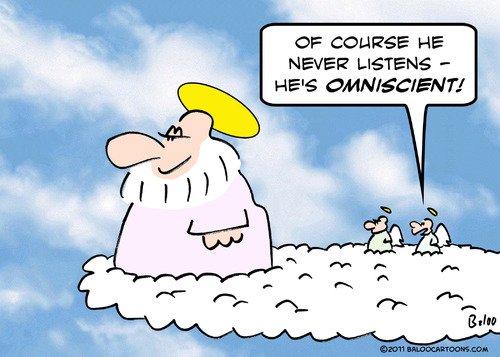
The Bible is full of references to the idea that God is omniscient, or all-knowing. Depending upon how you search, or what website you use, you can find scores of quotes supporting the concept. In many ways, the assumption of omniscience is sort of a baseline idea about the nature of God.
Examples can be found across the Old Testament, New Testament (though it seems less commonly), and the Psalms. For example:
- Jeremiah 23:24 — “Can a man hide himself in secret places so that I cannot see him? declares the Lord. Do I not fill heaven and earth?”
- Proverbs 15:3 — “The eyes of the LORD are in every place, keeping watch on the evil and the good.”
- Psalm 139 — “O Lord, you have searched me and known me! You know when I sit down and when I rise up; you discern my thoughts from afar. You search out my path and my lying down and are acquainted with all my ways. Even before a word is on my tongue, behold, O Lord, you know it altogether.”
- 1 John 3:20 — “For whenever our heart condemns us, God is greater than our heart, and he knows everything.”
- Hebrews 4:12-13 — “For the word of God is living and powerful, and sharper than any two-edged sword, piercing even to the division of soul and spirit, and of joints and marrow, and is a discerner of the thoughts and intents of the heart. And there is no creature hidden from His sight, but all things are naked and open to the eyes of Him to whom we must give account.”
I think you get the idea. Typically, when we’ve through about the character of God, omniscience is coupled with God’s omnipotence (all-powerful) and wholly goodness. This combination of attributes, however, has long troubled skeptics. For example, the 18th century philosopher David Hume had this to say: “If God is omnipotent, omniscient and wholly good, whence evil? If God wills to prevent evil but cannot, then He is not omnipotent. If He can prevent evil but does not, then he is not good. In either case he is not God.”
Leaving aside questions of good and evil, modern atheist critics have seized on the assumption of omniscience and argued that logically it cannot exist alongside the assumption that people have free will. Here’s an example:
Well, let’s explore the idea of omniscience and free-will. Let’s assume that God knows (with inerrant certainty, remember) that you will have eggs for breakfast tomorrow. Can you then decide to have cereals, or anything at all other than eggs?
If yes, doesn’t that mean God’s ‘knowledge’ of your future was wrong? How can that be if God is inerrantly omniscient? If no, then in what sense of the word do you have free will?
“Ah!” You might say, “God knows what my choices are, not what I will choose”. In that case, does God simply know the range of all possible futures, but not the actual detail? If so, this is some way off inerrant omniscience, isn’t it? In fact, it would probably not be beyond the wit of anyone who knows you and your culture to make a reasonably accurate forecast of the range of possible choices you will have for breakfast tomorrow. Nothing really special in that skill at all when you think about it.
No. There is absolutely no way to square this circle. Either you have free will or God is inerrantly omniscient, not both. Free will and an omniscient god cannot logically exist in the same Universe.
Lutheran pastor, writer, and commentator Nadia Bolz-Weber has weighed into this discussion as well. In a sermon on the parable of the Prodigal Son, she writes: “If you have been told that God is some kind of punishing, angry bastard with a killer surveillance system who is basically always disappointed with you for being a human being then you have been lied to.”
We’re going to talk about this idea of the omniscience of God in our conversation this evening. First of all, do you buy the idea that God is all-knowing and all-seeing, as the examples from the Bible suggest? How does that fit, or fail to fit, with the other attributes of God as all-powerful and wholly good. Is Hume right, are these things incompatible, given what we see and know about the world around us? Are the atheists right when they claim that omniscience of God is logically incompatible with free will? And finally, what about the quote from Bolz-Weber? How do we square the rejection of the idea that God is “an angry bastard with a killer surveillance system” with Jeremiah’s declaration that there is no place where you can hide from the gaze of God?
We’ll talk about all this, and probably more in our conversation. Join us for the discussion this evening beginning at 7 pm at Casa Real in downtown Oxford.